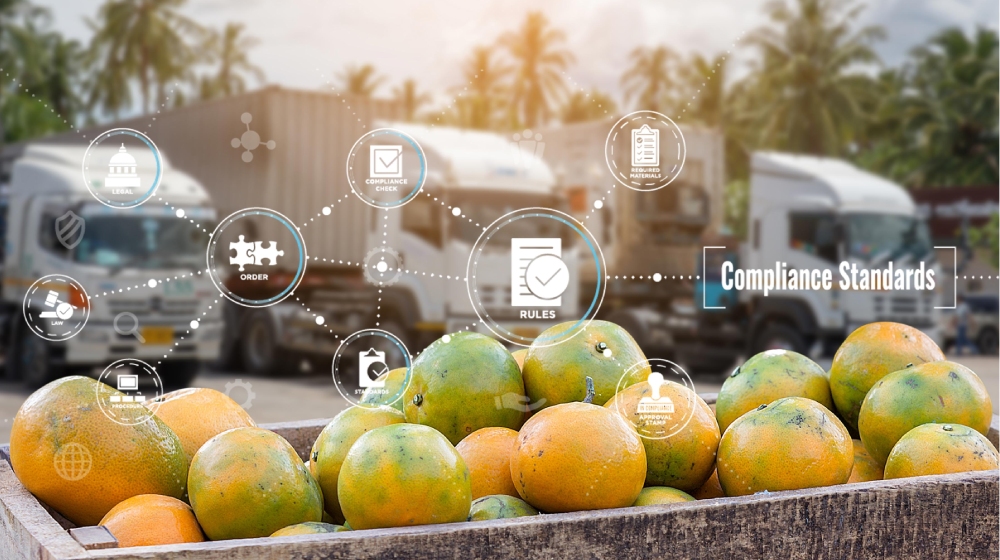If asked to compile a list of which industries have the most national and international regulations, the healthcare and financial sectors would almost certainly be top of mind.
These regulations are designed to reduce food waste, increase supply chain transparency, protect consumers, and preserve the food production and distribution ecosystem.
Although these regulations are necessary, enforcing them has often proved difficult for governing agencies like the CDC, FDA, and USDA. This is due to the sheer size and complexity of the food and beverage supply chain.
In order to increase compliance, reduce profit losses, and optimize food safety, enforcement and regulatory mechanisms must evolve. At the center of this evolution is blockchain technology.
Blockchain has the potential to disrupt traditional regulatory practices and pave the way for a more intelligent, more transparent food supply infrastructure.
The Challenges Associated with Food Regulations
Before recognizing how blockchain technology can reshape food regulation, it is vital to precisely understand what regulatory challenges the food industry is currently facing.
The following issues hinder the enforcement of timely and much needed regulatory requirements:
A Lack of Supply Chain Transparency
The United States’ food ecosystem is incredibly complex. It consists of a vast network of growers, manufacturers, distributors, retailers, and consumers.
At any one of these many touchpoints, valuable supply chain information can get lost in the shuffle. The loss of this information often means that taking corrective action, such as issuing a recall, requires distributors to “cast a wide net” to ensure potentially tainted food products are not left on store shelves.
The lack of transparency that characterizes our food supply chain makes it virtually impossible to regulate this vital industry adequately.
Changes in Consumption Habits and Preferences
Regulatory entities such as those outlined above have a finite number of financial resources and personnel.
As a result, these organizations often focus their efforts on food sources and locations of origin that pose the most significant risk to consumers. However, consumer food habits are in a constant state of flux.
Due to inefficient data collection and analysis practices, regulatory organizations are often slow to respond to food consumption trends. By the time they catch up to the latest fad, the next trend may already be emerging.
An Increase in Food Imports
As the global economy becomes increasingly interconnected, U.S. distributors and retailers are importing more food and beverage products than ever before.
However, regulatory agencies have a hard enough time monitoring our near-shore food supply chain, much less all of the various products brought in through our ports.
The rise in food imports has placed added strain on already overburdened regulatory processes, exacerbating the already inefficient food supply chain.
How Blockchain Is Changing the Face of Food Regulation
Does blockchain technology really hold the key to solving all of these regulatory woes facing the U.S. food ecosystem? The answer is: absolutely.
By strategically deploying Internet of Things (IoT) devices across the food supply chain and supporting these pieces of hardware with blockchain technology, food industry regulators can significantly enhance their ability to monitor food products.
Specifically, blockchain technology can:
Enhance Traceability
Blockchain-based record-keeping is immutable, which means that it cannot be surreptitiously altered or changed.
This attribute will allow growers, manufacturers, distributors, and retailers to precisely trace the origin of any food product through its entire lifecycle. These entities can share this information with regulatory agencies for auditing purposes.
When this chain of information is disseminated to consumers, it helps build trust and increase transparency.
Minimize Food Recall and Waste
Food recalls are a significant source of food waste in the United States. While food recalls are necessary when a food or beverage product has been contaminated, current regulatory practices make it nearly impossible to determine which shipments were impacted.
Often, these recalls result in hundreds or thousands of pounds of safe products that retailers must discard. Blockchain can end this problem by facilitating precision food tracking and management.
If food is contaminated and needs to be recalled, the appropriate entities can review blockchain records and pinpoint which affected shipments. This capability will result in better consumer safety and more effective regulation while also allowing the food industry to curtail waste.
Ensure Compliance with GS1 Standards
Finally, blockchain-based solutions usually include features that adhere to global supply chain management standards.
These solutions authenticate transactions, guarantee accuracy, and optimize efficiency while eliminating fraud. Blockchain also creates an auditable trail of information, which is an essential component of effective regulation.
To learn more about the power of blockchain and Farm to Plate’s approach to streamlining the food supply ecosystem, visit our Solutions page.
Pramod Sajja, CEO & President at Paramount Software Solutions (farmtoplate.io).
